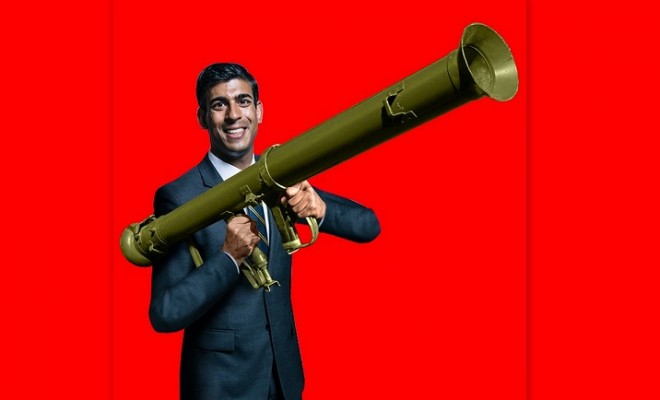
The longer the lockdown lasts, the bigger Sunak’s bazooka will be
On this site earlier this week, James Frayne wrote that “public opinion on the economy is a rapidly ticking timebomb” and that “if their employers consider themselves to be heading for catastrophe, it suggests that the public will catch up before too long”.
There must indeed come a point at which, in an imaginary world in which the present lockdown continues indefinitely, voter support for the shutdown ends, and public defiance of it begins – as people come to believe that the cost is no longer worth the gain. (It’s worth adding that there is no conclusive evidence, in the real world we live in, that this point has yet been reached.)
The flight from investment, drawing in of financial horns and laying-off of workers will have set in during early March. The second of the May bank holidays falls on May 25th. The period coming after it will mark roughly three months since the contraction began in earnest, the same timespan as an economic quarter.
There are two main views within government about how to approach early June. In order to keep the temperature cool, let’s depersonalise them, and call them the Health view and the Treasury view. Now imagine them being put to Boris Johnson. (ConservativeHome can report that while the Prime Minister may not be working he is certainly texting.)
Health first. “Look, Prime Minister, we mustn’t let defeat be snatched from the jaws of victory. Our solid win from this calamity is that the NHS hasn’t collapsed. We need more time to build it up so that it can cope with the second wave that will follow the gradual end of lockdown.”
“Furthermore, look at the polls. We’re riding high. You are seen to have led from the front simply by having survived the virus yourself. Other countries who got it earlier are now easing off their own shutdowns. Let’s wait and learn from them what works and what doesn’t. And we couldn’t announce any end to the lockdown until the daily death number falls, anyway.”
Now the Treasury. “Prime Minister, maybe the economy will rebound from three months of being effectively closed down – an experience it didn’t have even in wartime. But, frankly, even the OBR’s estimate of what happens if there is “no lasting economic hit” is alarming.
A 35 per cent GDP fall in the second quarter, unemployment at ten per cent, the largest single-year deficit since the Second World War, debt at over 100 per cent of GDP. Now translate that into human terms: lost jobs, ruined businesses and rising demands on the state. And into political ones. There won’t be an NHS at all without a wider economy to fund it. And those poll ratings will go south overnight. We must move by early May at the latest.”
Συνέχεια ανάγνωσης εδώ
Πηγή: conservativehome.com




